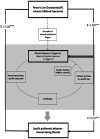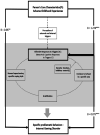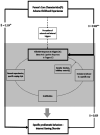Is the I-PACE (Interaction of Person-Affect-Cognition-Execution) model valid in South Korea? The effects of adverse childhood experiences (ACEs) on internet gaming disorder and the mediating effect of stress on adolescents
- PMID: 34935634
- PMCID: PMC8987428
- DOI: 10.1556/2006.2021.00081
Is the I-PACE (Interaction of Person-Affect-Cognition-Execution) model valid in South Korea? The effects of adverse childhood experiences (ACEs) on internet gaming disorder and the mediating effect of stress on adolescents
Abstract
Background and aims: The purpose of the present study was to investigate the effects of adverse childhood experiences (ACEs) on internet gaming disorder (IGD) and the mediating effect of stress based on the Interaction of Person-Affect-Cognition-Execution (I-PACE) model.
Methods: The 2017 survey data from one community addiction management center in South Korea were analyzed. A sample of 3,593 adolescents (mean age = 13.75 years, SD = 2.22) were recruited from 23 elementary, middle and high schools and 11 local children's centers. The mediating effect was analyzed by the three-step analysis method.
Results: Our study found that ACEs had a significant effect on the stress score (B = 1.420, P < 0.001) and the stress scale score had a significant effect the IGD score (B = 0.127, P < 0.001). After adjusting for the stress score in the model, ACEs had a significant effect on the IGD score (B = 0.328, P < 0.001), and the stress score had partial mediating effects (B = 0.1802, 95% C. I: 0.131-0.239).
Discussion: We found that ACEs directly affect IGD and that ACEs directly affect IGD through stress in support of the I-PACE model. In the sensitivity analysis, the mediating effect of stress in the low-risk IGD group was significant, but the mediating effect of stress in the high-risk IGD group was not significant. Prior ACEs should be considered when interviewing IGD clients. In addition, enhancing stress management skills would be beneficial to IGD clients with a history of ACEs, and actions reducing exposure to ACEs in childhood are necessary.
Keywords: adverse childhood experiences; internet gaming disorder; mediation; stress; youth.
Figures




Similar articles
-
Adverse childhood experiences on internet gaming disorder mediated through insomnia in Chinese young people.Front Public Health. 2023 Nov 22;11:1283106. doi: 10.3389/fpubh.2023.1283106. eCollection 2023. Front Public Health. 2023. PMID: 38074757 Free PMC article.
-
Adverse childhood experiences, problematic internet use, and health-related quality of life in Chinese adolescents.Eur J Psychotraumatol. 2023;14(2):2218248. doi: 10.1080/20008066.2023.2218248. Eur J Psychotraumatol. 2023. PMID: 37335002 Free PMC article.
-
Attention, Externalizing and Internalizing Problems Mediated Differently on Internet Gaming Disorder Among Children and Adolescents With a Family History of Addiction as an Adverse Childhood Experience.J Korean Med Sci. 2023 Jul 10;38(27):e221. doi: 10.3346/jkms.2023.38.e221. J Korean Med Sci. 2023. PMID: 37431544 Free PMC article.
-
A Bibliometric Analysis of Research into Internet Gaming Disorders in Korea.Int J Environ Res Public Health. 2023 Feb 21;20(5):3786. doi: 10.3390/ijerph20053786. Int J Environ Res Public Health. 2023. PMID: 36900797 Free PMC article. Review.
-
Merging Theoretical Models and Therapy Approaches in the Context of Internet Gaming Disorder: A Personal Perspective.Front Psychol. 2017 Oct 20;8:1853. doi: 10.3389/fpsyg.2017.01853. eCollection 2017. Front Psychol. 2017. PMID: 29104555 Free PMC article. Review.
Cited by
-
Association between childhood trauma and Internet gaming disorder: a moderated mediation analysis with depression as a mediator and psychological resilience as a moderator.BMC Psychiatry. 2024 Jun 4;24(1):412. doi: 10.1186/s12888-024-05863-4. BMC Psychiatry. 2024. PMID: 38834952 Free PMC article.
-
Childhood Adversity and Adolescent Smartphone Use Across Sexual Orientation and Gender Expression.JAMA Netw Open. 2024 Apr 1;7(4):e246448. doi: 10.1001/jamanetworkopen.2024.6448. JAMA Netw Open. 2024. PMID: 38607622 Free PMC article.
-
The relationship between childhood trauma and internet addiction in adolescents: A meta-analysis.J Behav Addict. 2024 Feb 9;13(1):36-50. doi: 10.1556/2006.2024.00001. Print 2024 Mar 26. J Behav Addict. 2024. PMID: 38340148 Free PMC article. Review.
-
Adverse childhood experiences on internet gaming disorder mediated through insomnia in Chinese young people.Front Public Health. 2023 Nov 22;11:1283106. doi: 10.3389/fpubh.2023.1283106. eCollection 2023. Front Public Health. 2023. PMID: 38074757 Free PMC article.
-
Adverse childhood experiences, problematic internet use, and health-related quality of life in Chinese adolescents.Eur J Psychotraumatol. 2023;14(2):2218248. doi: 10.1080/20008066.2023.2218248. Eur J Psychotraumatol. 2023. PMID: 37335002 Free PMC article.
References
-
- American Psychiatric Association . (2013). Diagnosis and statistical manual of mental disorders (5th ed.) . Washinton, DC: American Psychiatric Association.
-
- Brand, M. , Wegmann, E. , Stark, R. , Müller, A. , Wölfling, K. , Robbins, T. W. , & Potenza, M. N. (2019). The Interaction of Person-Affect-Cognition-Execution (I-PACE) model for addictive behaviors: Update, generalization to addictive behaviors beyond internet-use disorders, and specification of the process character of addictive behaviors. Neuroscience and Biobehavioral Reviews , 104, 1–10. 10.1016/j.neubiorev.2019.06.032. - DOI - PubMed
LinkOut - more resources
Full Text Sources


